Reunification
For up-to-date information regarding the reunification of Penn State's two law schools, please click here.
For up-to-date information regarding the reunification of Penn State's two law schools, please click here.
UNIVERSITY PARK, Pa. – Penn State Law in University Park hosted the U.S. Court of Appeals for Veterans Claims (CAVC) for a two-day visit, March 23 and 24, culminating in an oral argument hearing in a pending case. The visit also included multiple events that, together with oral argument, provided Penn State Law students with an immersive learning experience and a behind-the-scenes look into careers in the field of veterans law and how law is made by the judiciary.
Visitors from the CAVC included Chief Judge Margaret Bartley, a Penn State alumna, Judge Michael P. Allen, Judge Scott J. Laurer, Clerk of Court Gregory O. Block, two judicial law clerks, and counsel. Counsel for both the veteran, appellant, and the U.S. Department of Veteran Affairs, appellee, argued before the court for the pending case.
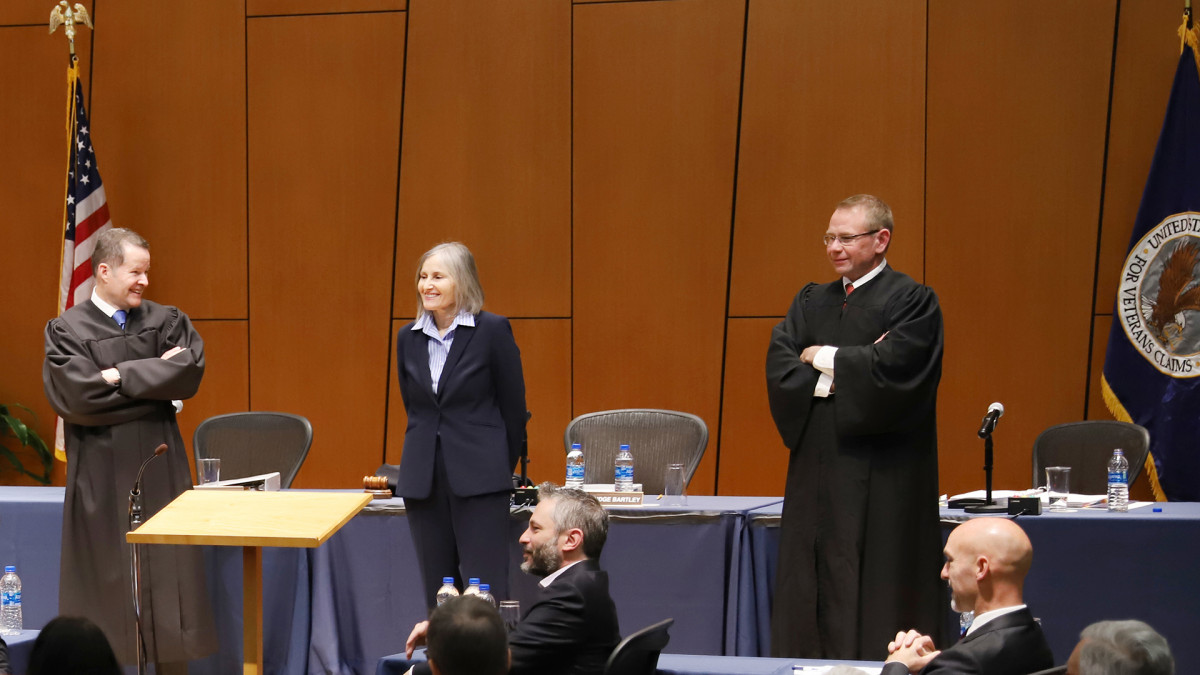
Left to right: Judge Scott J. Laurer, Chief Judge Margaret Bartley, and Judge Michael P. Allen, speaking in the Sutliff Auditorium during the CAVC visit to Penn State Law in University Park. IMAGE CREDIT: Penn State Law
“We were truly honored to host the Court and provide our students and local veteran community with a close-up look at judicial review of administrative agency action,” said James W. Houck, interim dean of Penn State Law in University Park and the School of International Affairs and retired vice admiral, Judge Advocate General’s Corps, U.S. Navy.
“The members of the armed services who placed their lives on the line for us deserve a fair hearing of their disability claims arising out of that service,” Houck added. “The Veterans’ Judicial Review Act of 1988 that created CAVC is important because without it, judicial review of VA disability decisions would not exist. We were fortunate to have so many local veterans organizations and advocates attend the argument, and engage with the court and our students in the unique opportunity for a question-and-answer session after the argument.”

James W. Houck, interim dean of Penn State Law in University Park and the School of International Affairs, speaks in the Sutliff Auditorium during the CAVC visit. IMAGE CREDIT: Penn State Law
The visit was part of CAVC’s educational outreach program in which the court holds oral arguments at law schools across the country several times per year, at the invitation of law school deans and veterans clinics.
Penn State Law’s Veterans and Servicemembers Legal Clinic organized the visit, and invited representatives from the Penn State Office of Veterans Programs, the Penn State Clearinghouse for Military Family Readiness, members of the Pennsylvania Department of Military and Veterans Affairs, as well as local veterans, county veteran service officers, Vet Center counselors, and Pennsylvania National Guard members—a community that often works together with the clinic to serve veterans in Pennsylvania.
“The law school was fortunate to have so many members of our local veterans community support and attend the argument and other events during the visit to show Chief Judge Bartley how much the Penn State and local community appreciate her service to veterans throughout her career and on the CAVC bench,” said Michele Vollmer, associate dean for clinics and experiential learning, clinical professor of law, and director of the Veterans and Servicemembers Legal Clinic.
The visit to Penn State Law, which was originally scheduled for March 2020 but was postponed due to the pandemic, was the first in-person outreach trip for the CAVC since before the outbreak of COVID-19.
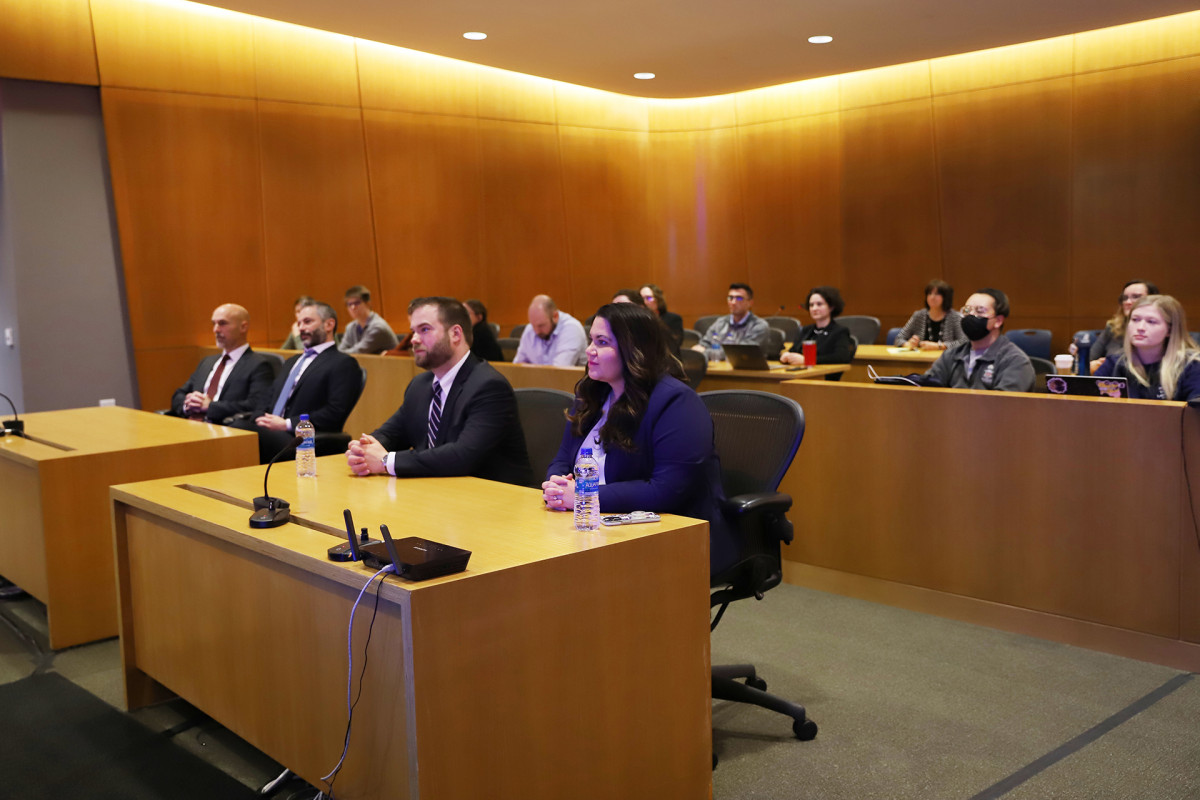
Counsel arguing before the CAVC included (right to left) Jenna Zellmer, Christian McTarnaghan, Ronen Morris, and Christopher Wallace. IMAGE CREDIT: Penn State Law
The CAVC is an Article I appellate court created by the Veterans’ Judicial Review Act of 1988. It has exclusive jurisdiction to review decisions of the Board of Veterans’ Appeals, an administrative tribunal within the U.S. Department of Veterans Affairs (VA) that performs the final review of agency decisions before they may be appealed to the judiciary.
On March 24 in Penn State Law’s Lewis Katz Building at University Park, the three-judge CAVC panel held oral argument in Walleman v. McDonough (No. 20-7299). The argument was broadcast live on the court’s YouTube channel and a recording is available as well. The issue in the case is whether the rule against pyramiding precludes a separate disability rating for a veteran’s knee instability under 38 C.F.R. § 4.71a, DC 5257, when the veteran already has a disability rating under DC 5259 concerning the effects of the removal of cartilage generally.
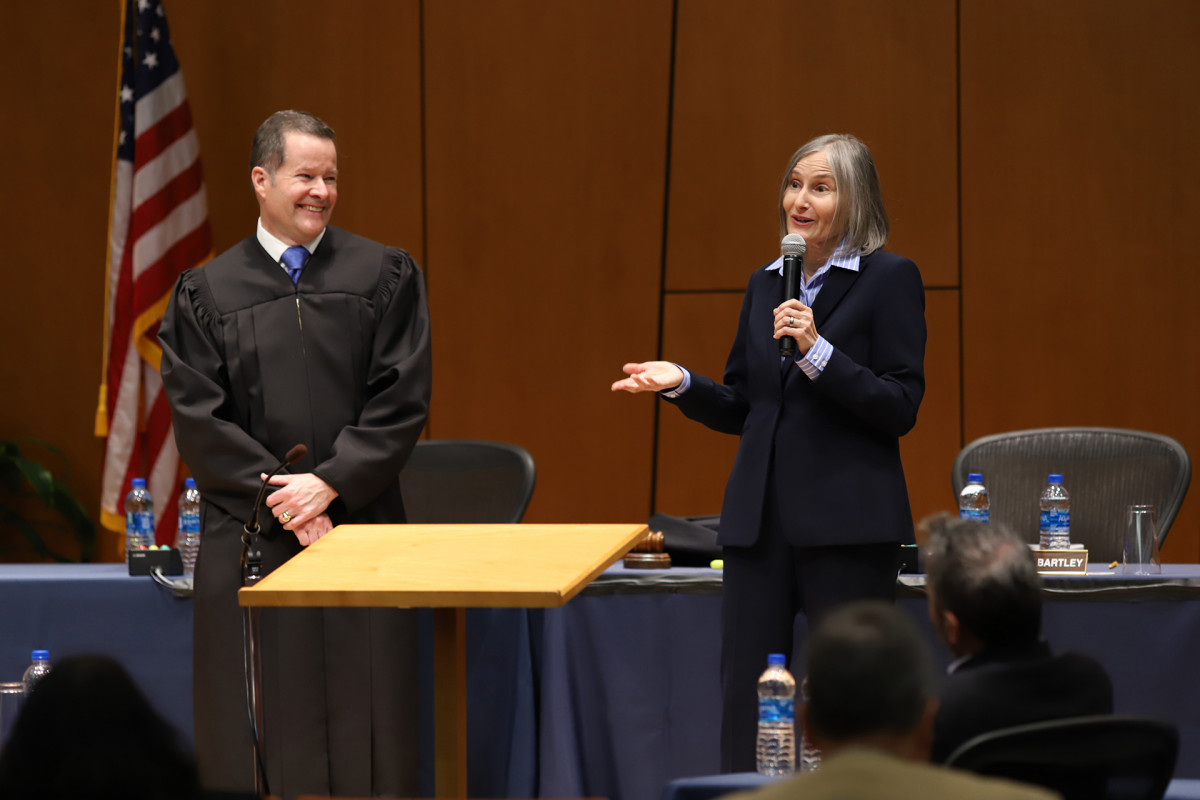
CAVC Chief Judge Bartley and Judge Laurer speak in the Sutliff Auditorium during the visit to Penn State Law in University Park. IMAGE CREDIT: Penn State Law
The hearing offered Penn State Law students an opportunity to witness an appeals case first-hand and to learn more about veterans benefits, federal practice, and administrative law. In addition to a question-and-answer session after the argument, the CAVC judges, counsel appearing before the court and the court’s law clerks met with law students, faculty and the public at a reception in the Katz lobby.
“After attending this hearing, I realized that oral argument is not just a 'presentation' at the court—it's a chance for counsel and judges to engage in a conversation to understand and interpret the law,” said Audry Thompson, a Class of 2022 J.D. candidate at Penn State Law, Ph.D. candidate in the College of Education, and a member of the Veterans and Servicemembers Legal Clinic.
“I could really tell that everyone involved cared deeply about veterans and getting the law right,” Thompson added.
Altogether, the CAVC events—including the oral argument hearing and other talks and panel discussions—gave Penn State Law students a rare opportunity to immerse themselves in judicial decision making generally, and veterans law specifically. Beyond learning from the content of the specific events, students were also able to meet and talk with the judges, clerks, and attorneys in between events and at a private dinner held on the evening of March 24.
As a result of those interactions, students gained an insider’s perspective on what it looks like to practice veterans law from a variety of angles, both inside and outside the courtroom. Students also learned what role judicial clerks play in preparing binding and non-binding decisions, and what process judges follow, and think about, when writing an opinion.
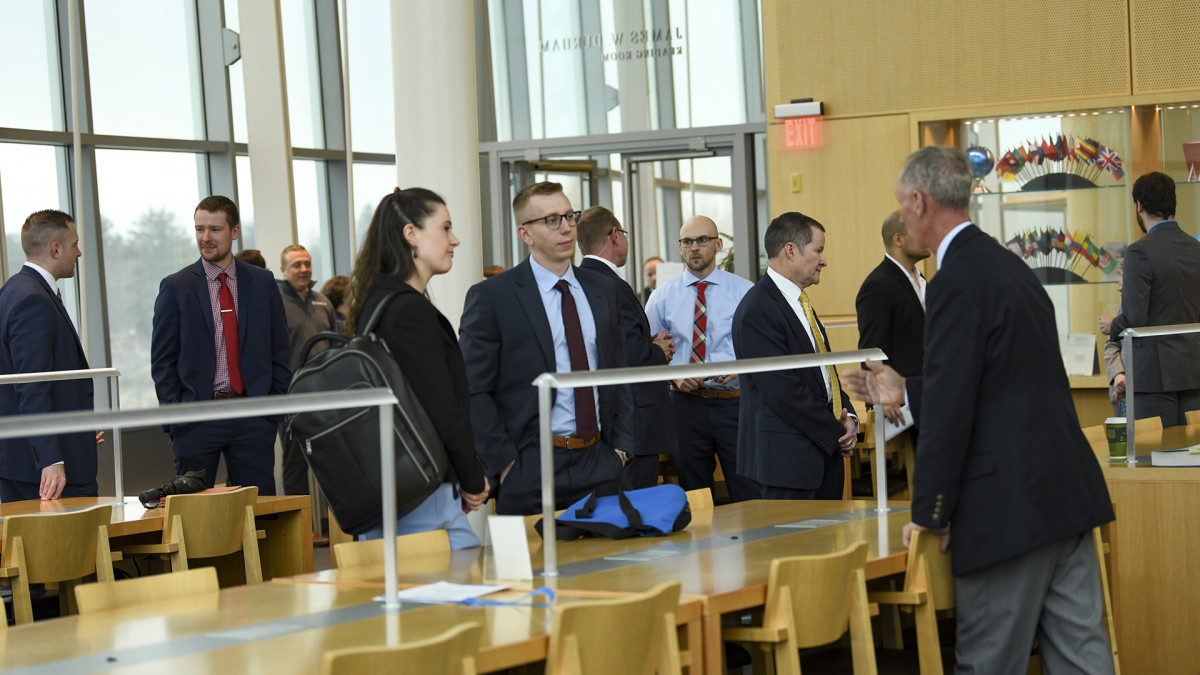
Penn State Law students and faculty had the opportunity to network with CAVC judges, judicial clerks, and counsel during the CAVC visit. IMAGE CREDIT: Penn State CommAgency
“Penn State Law students gained valuable insight into interacting with members of the judiciary, their team members, and the counsel who practice in appellate law before them, on a personal and professional level that is hard to duplicate in a law school environment,” Vollmer said. “When students see experienced judges and attorneys in this type of setting, they are inspired and energized to become the best lawyers they can be. At the same time, that personal connection allows students to more easily envision themselves as effective practicing attorneys in a more tangible way than law school classrooms usually provide.”
Two of the events were open primarily to Penn State Law students and provided valuable career insights.
In one event, CAVC Judge Allen provided a judge’s perspective on how to prepare and draft effective legal writings, including judicial opinions and appellate brief writing. As a former law professor at Stetson University College of Law, Judge Allen was also able to give an academic perspective, as well as advice on what is persuasive to a judge.
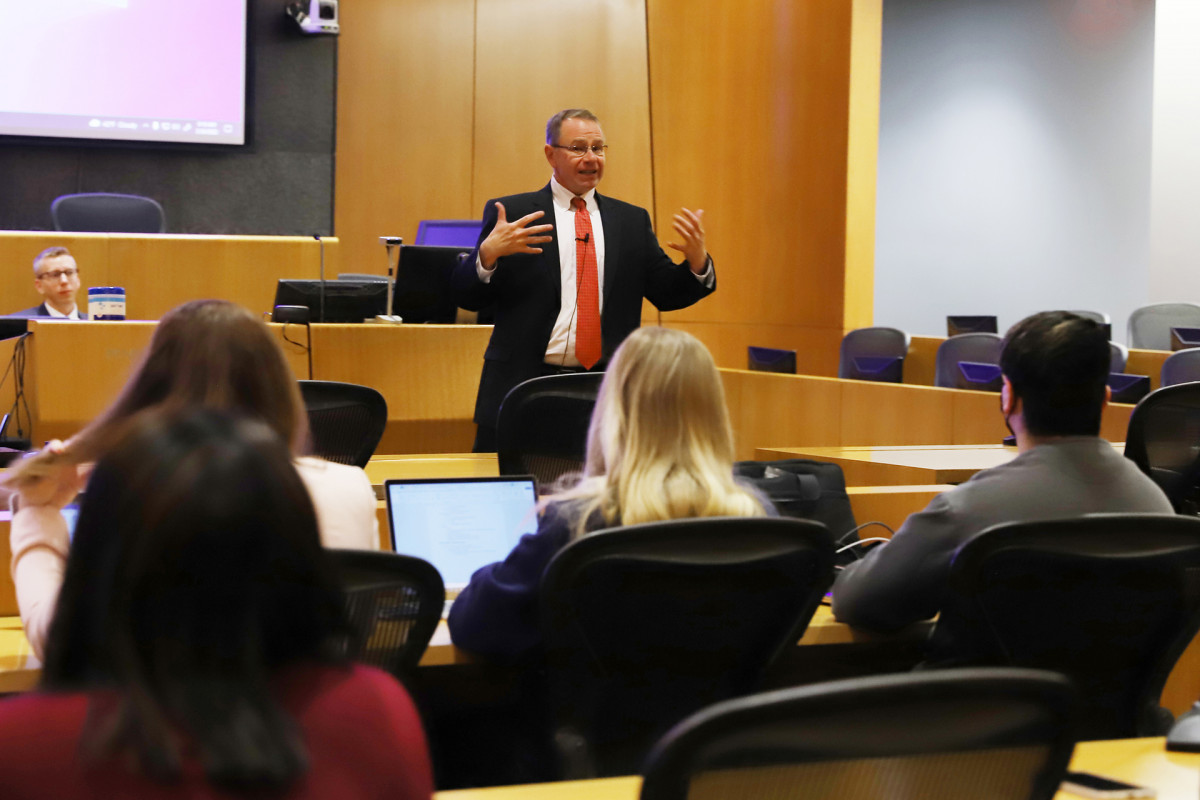
CAVC Judge Allen speaking to students at Penn State Law in University Park. IMAGE CREDIT: Penn State Law
“When Judge Allen described himself and his law clerks as ‘professional readers,’ I appreciated in a new way the work that the judiciary does,” said Sean Duffy, a second-year law student and member of the Veterans and Servicemembers Legal Clinic. “His talk made me want to improve how I approach brief writing so my writing will stand out among the many briefs that a court will read.”
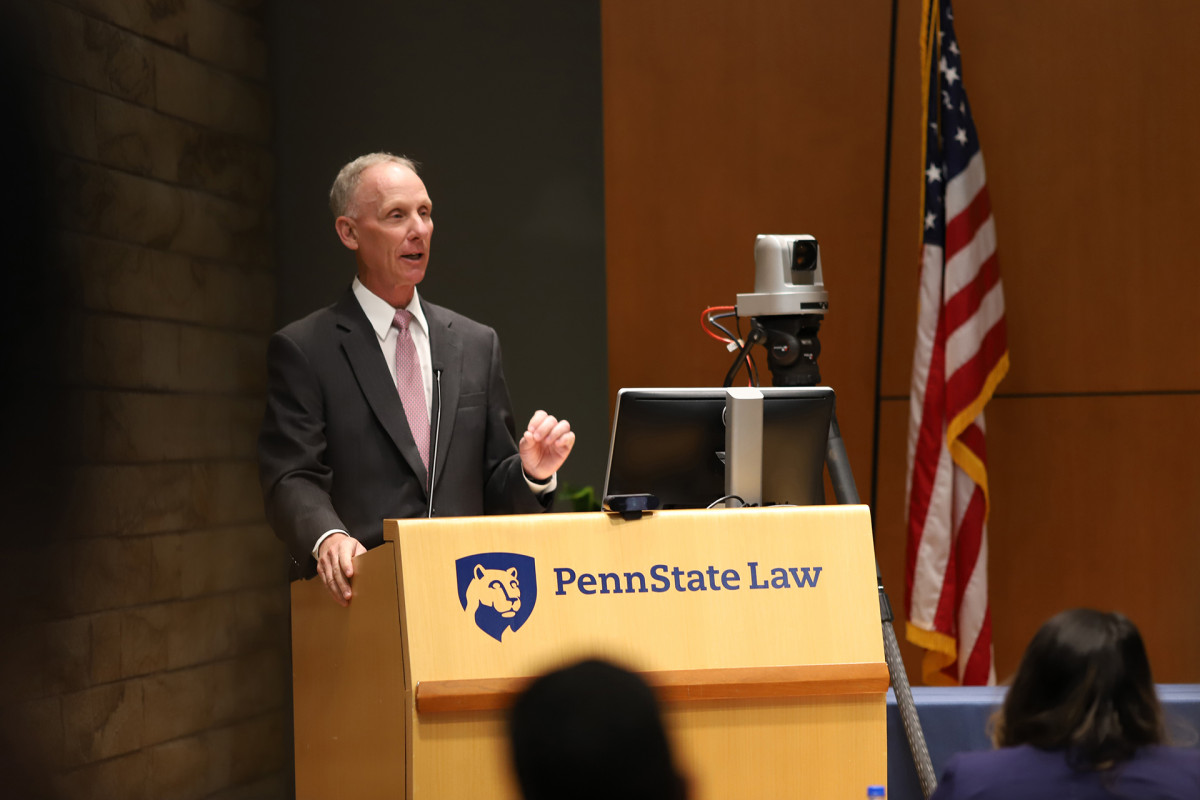
CAVC Clerk of Court Gregory Block speaks to the audience prior to oral argument. At a previous event, Block spoke to Penn State Law students about career opportunities in federal law and veterans law. IMAGE CREDIT: Penn State Law
In a separate panel, CAVC Clerk of Court Gregory Block, CAVC judicial law clerks, and counsel arguing before the court discussed the role of judicial law clerks and litigators, as well as career opportunities in federal law, veterans law, and other legal professions with the Department of Defense and the Department of Veterans Affairs.
“Our students were fortunate to receive practical advice from such experienced advocates, and were encouraged to take advantage of all of the networking opportunities that come from hosting the court,” said Magen Mihok, assistant dean of career services at Penn State Law.
One of the panels examined a new feature of the CAVC—its authority to hear class action cases.
When the U.S. Congress created the CAVC in 1988, it did not grant it explicit class action authority, a distinction that remained for nearly 30 years. That changed in 2017, when the U.S. Court of Appeals for the Federal Circuit held, in Monk v. Shulkin, 855 F.3d 1312 (Fed. Cir. 2017), that the CAVC does have authority to hear class action cases.
The new class action authority added a novel aspect to the CAVC: as an appellate court, CAVC does not have district court judges nor an inherent fact-finding mission, and so it had to grapple with how to incorporate class action authority and, because it is not governed by the Federal Rules of Civil Procedure, it had to create its own set of rules to address class actions.
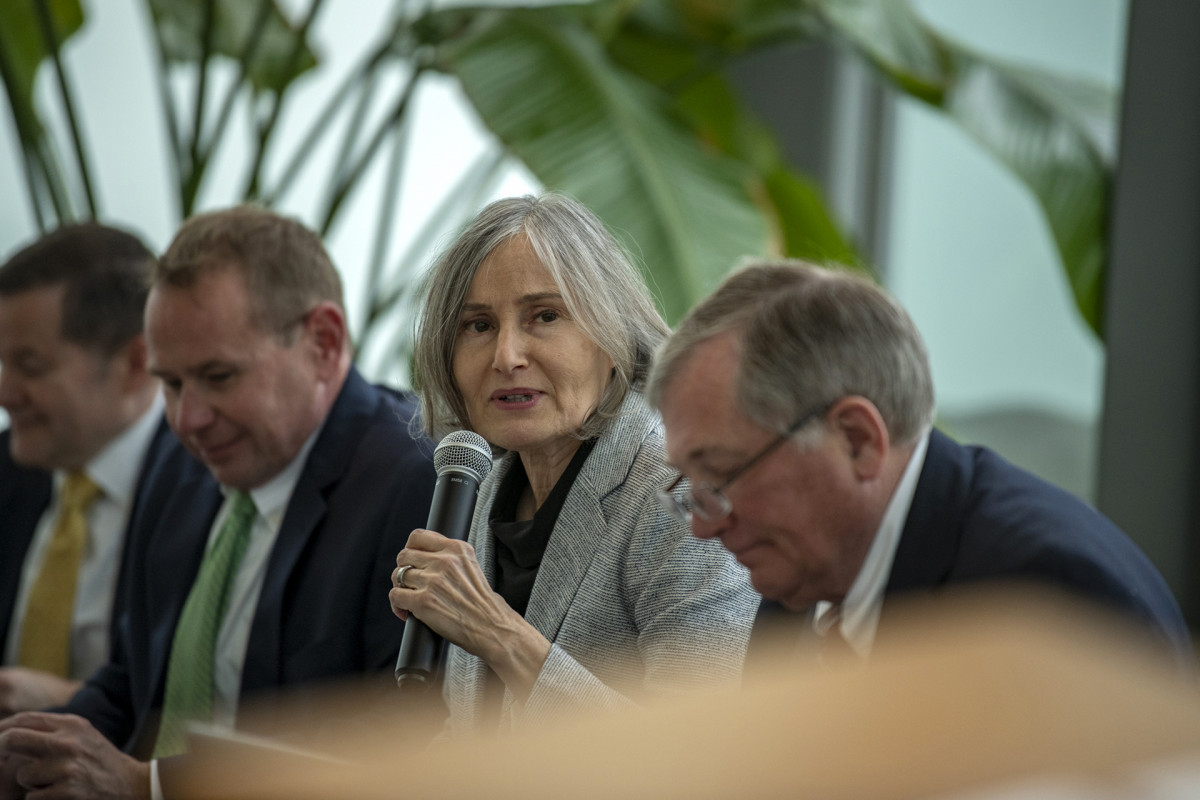
Right to left: Judge Brooks Smith, Distinguished Jurist in Residence at Penn State Law and senior judge of the U.S. Court of Appeals for the Third Circuit; CAVC Chief Judge Margaret Bartley, a Penn State alumna; CAVC Judge Michael P. Allen; and CAVC Judge Scott J. Laurer. IMAGE CREDIT: Penn State CommAgency
In the panel, the CAVC judges discussed this significant change in the court’s authority, some of the challenges the court faced in creating new rules, and the role of class action with regard to veterans claims.
Also participating in the panel were four Penn State Law faculty members who also serve as current and former judges: Judge William Arbuckle, adjunct professor of law and magistrate judge for the Middle District of Pennsylvania; Judge Kim Gibson, adjunct professor of law and senior judge of the U.S. District Court for the Western District of Pennsylvania; Judge Brooks Smith, Distinguished Jurist in Residence at Penn State Law and senior judge of the U.S. Court of Appeals for the Third Circuit; and Judge Thomas Vanaskie, adjunct professor of law and former judge with the U.S. Court of Appeals for the Third Circuit.
Their presence in the panel provided perspectives, from the district court and circuit appellate court levels, of a typical federal class action under Rule 23 of the Federal Rules of Civil Procedure, which was compared and contrasted with the CAVC’s new class action rules.
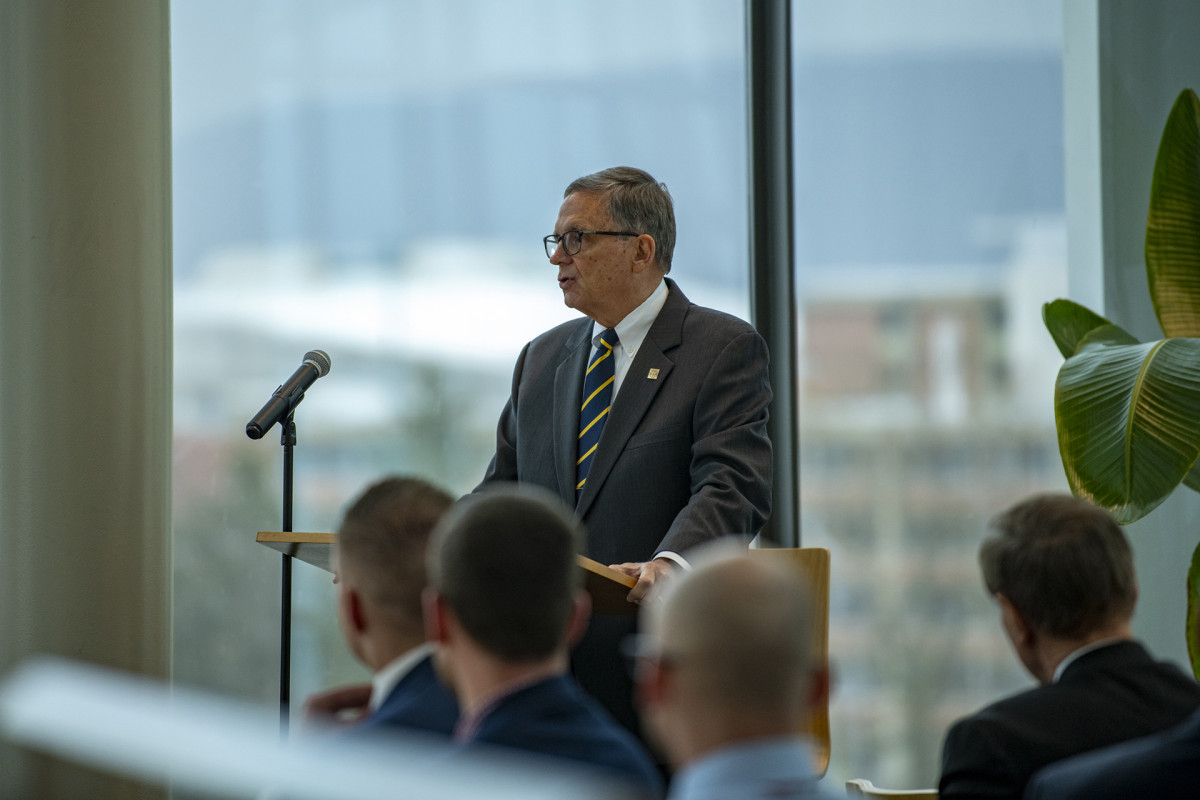
Judge William Arbuckle, adjunct professor of law at Penn State Law and magistrate judge for the Middle District of Pennsylvania, served as moderator during the class action panel. IMAGE CREDIT: Penn State CommAgency
“We were honored and grateful that these four distinguished Pennsylvania judges took time from their busy schedules to engage with our guest judges from CAVC and have a lively discussion with our students,” Interim Dean Houck said. “Judge Arbuckle was a fantastic moderator and we appreciated his introductory remarks that helped students to access the judges’ remarks on the advanced legal topic.”
In addition to broadening the classroom experience, especially for students studying federal courts and class actions, the panel discussion showed how lawyers, and even law students, can find creative ways to challenge existing law to better advocate for their clients.
“So much of law school is about learning what the law requires, and how parties and their advocates need to stay within those boundaries, but this discussion was an opportunity for students to explore how creative legal thinking can lead to significant changes in the law,” Vollmer said. “Judge Allen encouraged the students in the audience to be creative in their approach to law and legal argument, and Chief Judge Bartley encouraged them to be courageous when making creative arguments, and those practice tips really resonated with the students.”